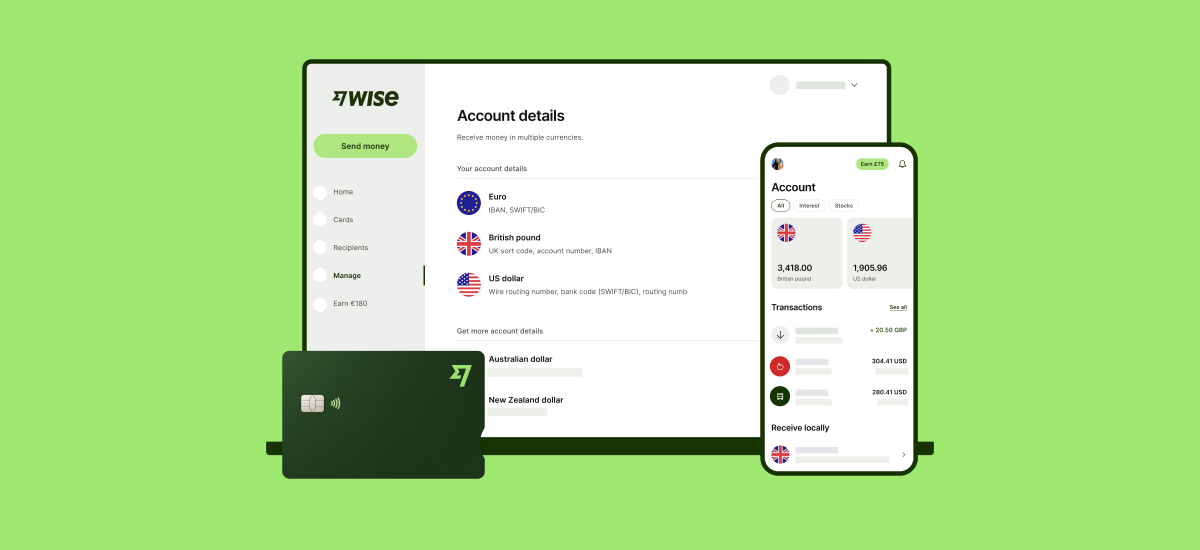Best PayPal Account Type for Freelancers (Complete Overview)
Looking for the best PayPal account type for freelancers? You may find that either the personal or business account might be worth it. Learn more here!

Already have a robust network and are ready to turn your expertise into a thriving consultancy? You’re in the right place. In this article, we’ll explore practical advice on becoming a successful professional and tips for success.
We'll also discuss how Wise Business can be a game changer for getting paid and maintaining a strong cash flow in your consultancy venture. Let’s get this journey started.
Looking to receive payments at low-cost?
Get a Wise Business account >>
Trustpilot: 4.3/5 average rating - Excellent¹
No minimum balance required and no monthly fees
If you know your stuff, you’re good at it, and you think it’s time to become a consultant – know that it can definitely be a rewarding path. But how do you go from being an industry professional to a successful consultant? In this section, we’ll lay out the details, from pinpointing your niche to getting paid smoothly.
Being a successful consultant starts with identifying an area of expertise that is in demand in the market. Some of the fastest-growing consulting sectors include technology and management consulting.²
You could be a marketing guru, an IT wizard, or a financial planning maestro. And it doesn’t have to be the primary job you do at work on a day-to-day basis. Evaluate your skills, qualifications, and experience to find your strength. It could be hobbies you’ve developed in your own time or something you’ve gotten recognized for at work.
So, before you make your final decision, conduct market research to identify potentially profitable niches. Then, make sure you have the experience to make you authoritative in the field and that you’re passionate about the work you’re going to be doing.
In addition to having a unique offering, all consultants need a strong network of contacts and the skills to market themselves as an expert in their field.
| Types of Consultants |
|---|
| Management Consultant |
| Financial Consultant |
| Education Consultant |
| Strategy Consultant |
| Marketing Consultant |
| IT Consultant |
| Human Resources (HR) Consultant |
| Legal Consultant |
| Healthcare Consultant |
| Environmental Consultant |
| Operations Consultant |
| PR Consultant |
| Career Consultant |
If you consider yourself and expert in your field or a specific niche, then there is nothing stopping you from being a consultant in that area. The above list is a just a drop in the bucket in terms of what you can do in the area of consulting.
See the Best Banks for Small Businesses >>
Becoming a consultant often hinges on being recognized as an expert in your field. Gaining relevant certifications or qualifications will certainly bolster your credibility and give you an edge.
Depending on your niche, identify relevant courses, training programs, or qualifications. For example, a management consultant could benefit from getting a Certified Management Consultant (CMC) designation, and an IT consultant could get a Microsoft Certified: Azure Solutions Architect Expert certificate to boost their reputation.
While earning these certificates is important, so is continuing education for staying up-to-date with trends and practices in your field.
As a consultant, your portfolio shares your story and expertise, and builds trust with potential clients. It’s about making them feel confident about choosing you for their needs. Here's how you can create a portfolio that truly represents you.
Starting with low-cost or pro-bono work: When beginning your consulting career, you might not have too many projects under your belt. This is where offering your services at a lower rate or pro-bono can come into play. It could be for a start-up, a non-profit, or a small local company. This work might seem counter-intuitive initially, but it's an investment in your future, providing you with examples of your work and the opportunity for positive testimonials.
Showcasing a variety of work: Your portfolio should illustrate the range of your skills and experience—it's your chance to show rather than tell what you can do. Engage your audience with an array of projects – if you are seeking a marketing consultant job, include successful campaigns involving SEO, social media, and digital advertising. Personalize each case by adding a brief summary of what was done, the challenges tackled, the solutions provided, and the achievements.
Including testimonials and achievements: Clients want to know what it's like to work with you. Including positive testimonials and highlighting your accomplishments can greatly add to your portfolio's appeal. Seek endorsements from clients you've worked with and ask them to focus on your unique strengths or impressive results you've delivered. Remember, social proof is powerful - according to a survey by G2, 9 out of 10 B2B buyers are more likely to purchase after reading a positive review.³
Keeping your portfolio updated: As your consulting services evolve, your portfolio should too. Regularly highlight new skills, relevant training, and noteworthy projects, showing your growth and adaptability as a consultant.
Effective networking is the lifeblood of a successful consultancy. It's about building and fostering relationships, sparking conversations, and broadening your professional horizons. As quoted in Forbes, a staggering 85% of all jobs are filled through networking. Consultants who network effectively can hope to tap into a wealth of opportunities.⁴
Conferences, seminars, and trade shows are prime networking real estate. They bring together like-minded professionals within your field and provide a chance to learn about industry trends and forge potentially valuable connections.
Taking things online, digital networking platforms like LinkedIn are invaluable for consultants. You can connect with potential clients, partake in industry discussions, share your articles or expertise, and stay in the driver’s seat of your networking efforts.
Of course, networking isn't only about making new connections. Your past clients, classmates or co-workers could become your most significant referrals.
Setting up your own consulting business is an exciting journey brimming with opportunities and challenges. It requires thoughtful planning and making sound decisions, starting with creating a business plan. It should outline your goals, target clients, services, pricing, marketing strategies, and financial projections.
The next step is making your venture official. The process varies by country or state, but it usually involves choosing a business name that’s both appealing and identifiable and selecting your business structure, such as LLC, S-Corp, sole proprietorship, etc. For extra guidance, you might want to consult with a business attorney or accountant to understand the best option for you, depending on your business goals, potential liability, and tax implications.
When it's time to start working with clients, you’ll need a pricing structure. Your pricing should value your expertise, cover your expenses, and also stay competitive. Many consultants price their services based on hourly rates, but you might also consider project-based, retainer, or value-based pricing depending on your services and client needs.
| 5 Ways to Price Your Consulting Services⁷ |
|---|
| Hourly Billing: The most straightforward way to price your services |
| Productized Services: Couple services into a product with a flat price |
| Value-based Pricing: Price your services after understanding their value to the client |
| Retainer Agreements: A great way to continue earning after you earn your client's trust |
| Pay for results: Risky but can give you a good payday if you succeed |
Once the money starts to come in, open a business account and consider hiring a part-time accountant or using accounting software to keep track of your finances. Well-managed finances are key for tax preparation, cash flow management, and making informed business decisions.
Who’s going to hire you if they don't even know you exist? Ideally, your marketing strategy acts as a bridge between your services and the clients who need them. While online marketing is the norm nowadays, you might want to consider offline platforms tailored to your target audience. Craft a compelling story around your brand, highlight your unique selling propositions, and create a persuasive call to action.
Digital marketing strategies, such as SEO, content marketing, and social media marketing, can amplify your visibility immensely. For instance, creating a professional website that ranks well on search engines can be a substantial organic lead generator. A regularly maintained blog can establish your authority and expertise. Leveraging LinkedIn, Facebook, or Twitter can help you engage with potential clients and keep your finger on the pulse of industry trends.
Personal branding is another handy tool in a consultant's marketing arsenal. A well-built personal brand can make you a 'go-to' expert in your niche. Speaking at webinars, writing thought-leading articles, publishing ebooks, or running a podcast can boost your personal brand.
Be sure to experiment with multiple strategies, measure their effectiveness, and fine-tune your approach based on what works best for your consultancy. Your ultimate goal should be to create a marketing mix that reliably funnels potential clients towards your services.
As satisfying as it is to make a difference with your expertise, consulting is a business— and businesses need to make money. Having a steady cash flow is the backbone of any successful endeavor, and collecting payment promptly and smoothly is part of that equation.
The best way to do so is to streamline your invoicing process. A well-structured, professional invoice can make payment easier for your clients and improve your chances of getting paid on time.⁵ Tools like Wise Business can simplify invoice creation and also make it easy to securely receive payments online.
Between your clients and yourself, establish your payment terms and stick to them. This includes specifying when payment is due, any penalties for late payment, and accepted methods of payment. Above all else, maintain an open line of communication with your clients.
Starting a consulting career without direct experience can be challenging, but it's not impossible. While you can generally still follow the steps above, there are certain things you can do to give your career a jumpstart:
Leveraging transferable skills and knowledge: Dig deep into your skill repertoire. You might be surprised how many of your abilities, such as project management, problem-solving, or communication, can be valuable in a consulting context.
Position yourself as an expert: Build a strong knowledge base around your chosen focus area. This might involve taking extra courses, obtaining certifications or voraciously reading up on industry news. Soon, you'll start feeling comfortable with the lingo and practices.
Starting small: Consider starting with smaller consulting projects, potentially through platforms like Upwork or Fiverr. Delivering excellent work can get you positive client reviews, which are invaluable when starting out.
Mentorship and coaching: Finding a mentor can provide you with a wealth of insights and practical advice. Look for someone who is knowledgeable and experienced in your chosen field of consulting. They can offer you first-hand advice, constructive criticism, and maybe even introductions to potential clients.
A consultant is considered an expert who provides professional advice in a specific area of expertise, such as management, marketing, IT, human resources, finance, and more. They identify and analyze the challenges or problems a business is facing, provide strategies to address these issues and implement tailored solutions for improvement.
Consultants can work within a consultancy firm, be affiliated with an agency, or operate independently. The job often requires spending a significant amount of time on client locations, understanding their operations, supervising changes, and suggesting improvements. They conduct in-depth tests, carry out research, prepare detailed reports, and present their findings to the clients.
Successful consultants usually possess a specific set of skills that help them do their job effectively. Here are some examples:
Problem-solving skills: Consultants are essentially problem solvers, identifying complexities and developing practical solutions.
Analytical capabilities: Sharp analytical capabilities are required to analyze enormous amounts of data and connect the dots.
Communication skills: Verbal and written communication for consultants, as they need to clearly convey complex concepts to diverse audiences.
Project management skills: As consultants often spearhead projects, they need to plot timelines, coordinate resources, and oversee processes to ensure they’re successful.
Interpersonal skills: Building strong relationships with clients and stakeholders are a big part of the job.
A good consultant goes beyond simply having the relevant skills. They know how to foster a client-centric approach, focusing on creating value for the client. They have an in-depth understanding of their field of specialization and stay updated with industry trends and shifts.
Critical thinking is another hallmark of a good consultant. They should be able to think out of the box, challenge the status quo, and foresee potential pitfalls. They display outstanding leadership, guiding teams towards achieving project objectives while fostering a positive work environment.
Good consultants are also ethically grounded. They maintain high standards of confidentiality and honesty, strengthening trust in the client-consultant relationship. They’re also resilient - they see failures as opportunities to learn and grow. They're always evolving, refining their skills and knowledge to stay at the forefront of their field. Whether it's through getting additional certifications, attending workshops or learning new technologies, they continually push their professional boundaries.
Consultants play an important role in the business ecosystem, offering objective, expert advice to solve complex problems and facilitate growth. They can be a much-needed lifeline for businesses navigating volatile markets, rapid technological change, or internal challenges they can't solve alone.
Diagnose Problems: Consultants identify the pain points or issues affecting business performance.
Strategize Solutions: They devise bespoke strategies targeting these challenges, employing their analytical prowess to offer fresh perspectives.
Implement Changes: Consultants often guide the implementation of their suggested strategies, ensuring their successful deployment.
Facilitate Learning: They share their expertise and provide training to the in-house team. This knowledge transfer equips businesses to independently tackle future challenges.
Drive Results: Above all, consultants act as catalysts for change, driving results like increased revenue, reduced costs, improved efficiency, or enhanced customer satisfaction, anchored by their insights and recommendations.
| Let’s look at this example: |
|---|
| A retail business is struggling with decreased profitability and customer satisfaction. They hire a seasoned business consultant specializing in retail. After extensive analysis, she spots the problems – high shipping costs and outdated inventory management. The consultant puts together a streamlined inventory process, introduces software to improve tracking, and negotiates lower shipping costs with providers. They then train the staff to use these new systems efficiently. Over time, the company sees lower operational costs, improved inventory turnover, and increased customer satisfaction – renewing their business. |
Becoming a business consultant involves a great mix of relevant education, industry experience, and a range of interpersonal skills.
Educational foundations: Kick off with a bachelor's degree in business, economics, finance, or a related field. Some consultants add to their credibility with a Master's in Business Administration (MBA).⁶
Industry experience: Get significant experience within the industry you aspire to consult in. This might involve working in roles related to management, finance, marketing, operations, or HR.
Identify a niche: Identify a specialization within the broad business landscape. You might choose to provide eCommerce business consulting, operations consulting, or lean management consulting based on your expertise.
Certifications: Depending on your niche, certain certifications can provide an edge. For instance, getting Certified Management Consultant (CMC) recognition can bolster your consulting credentials.
Networking and building a client base: Attend industry events, network online, and start to build relationships. Initial clients often come through personal networks.
Ongoing learning: The business landscape evolves rapidly. Keep learning, stay updated with trends, and adapt your consulting approaches.

In a technology-driven world, finding consulting jobs has become more accessible and diverse. Not sure where to start? Take a look at these strategies and platforms:
Word of Mouth: This option is always the most popular, as some of your biggest advocates are those closest to you, and they can vouch for your skills in and abilities before you start reeling in clients. But, don't forget that even your friends have a limit, and you should be able to deliver to ensure clients keeping in further down the line.
LinkedIn: This professional networking platform also serves as a marketplace for jobs. Make sure your profile is optimized, portray your expertise and engage with content relevant to your industry.
Job boards: Websites like Upwork, Fiverr, Freelancer.com, Toptal, Indeed, Glassdoor, and Monster are excellent places to find consulting jobs posted by firms across the globe.
Industry events: Conferences, webinars, and meetings could open doors to job opportunities in real time. Plus, face-to-face networking often helps in creating a lasting impression.
Networking: Never underestimate the power of connections. Your network may well know of unadvertised consulting opportunities.
Consultancy firms: If you prefer more traditional routes, reach out directly to consultancy firms. Even if they have no open positions, they might keep you in mind for future opportunities.
Many consultants use Wise Business to conduct business locally and overseas to save on fees and costs.
Businesses can pay a one-time fee for accounts details in global currencies, such as USD, EUR, GBP, CAD, so they can receive money without any additional fees.
| Some other features Wise Business users love |
|---|
| Account Software Integration: QuickBooks, FreshBooks, Xero, Sage, and Wave |
| Signing up to Wise Business allows access to BatchTransfer which you can use to pay multiple invoices in one go. |
| The Most International Account: Hold 40+ currencies at once |
| Transparency: Wise Business is trying to get rid of all your business account fees |
Wise Business aims to make cross-border payments easy, secure, and economical for consultants. It's an essential tool for consultants aiming to build a global client base. With Wise Business, you can get paid in multiple currencies without worries about huge fees. They provide the mid-market rate, meaning you get the fairest exchange rate possible, similar to the one you find on Google, and they charge only a small, upfront fee.
Their intuitive platform makes it easy to manage invoices, track payments, and reduce the hassle of dealing with international transactions. Not to mention, setting up your account is a breeze.
Get a Wise Business account >>
Sources:
*Please see terms of use and product availability for your region or visit Wise fees and pricing for the most up to date pricing and fee information.
This publication is provided for general information purposes and does not constitute legal, tax or other professional advice from Wise Payments Limited or its subsidiaries and its affiliates, and it is not intended as a substitute for obtaining advice from a financial advisor or any other professional.
We make no representations, warranties or guarantees, whether expressed or implied, that the content in the publication is accurate, complete or up to date.

Looking for the best PayPal account type for freelancers? You may find that either the personal or business account might be worth it. Learn more here!

Embrace the flexibility of remote work with our guide on working remotely from another country. Gain insights into legal considerations and optimize your remote

Looking for a good time-clock app for your small business? No problem. Let's take a look at the best free and paid apps for you and your team.

Money-making apps consist of a few categories: Long-term freelancing apps, short-term task apps, delivery and taxi apps, and apps to sell your stuff.

1) Wise: Independent Contractor Account 2) Wonolo: Freelance Job Platform 3) TurboTax: Tax app 4) DoorDash: Deliver App 5) Fantastical Calendar: Free App

As long as you know how to market your skills and rates, you'll be able to profit quickly from Upwork. Let's jupm